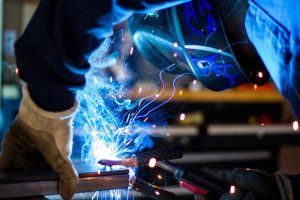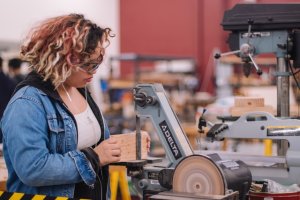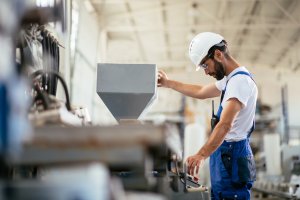Industrial Injury Claims
Injured in a factory accident? You could be entitled to compensation
Factory accidents can cause serious injuries with lasting consequences. If your employer failed in their duty of care, our expert solicitors can help you claim compensation on a no win no fee basis.
“They punch well above their weight. The quality of service they provide equals that of any of the larger top-name firms in this area.”
“Fielding a first class, very well resourced team of litigators, the personal injury department at Osbornes is rated for its diverse workload of complex, high-value injury claims.”
Introduction
The manufacturing industry employs 10% of the British workforce but accounts for 25% of all fatal workplace accidents and 16% of reported accidents at work. The factory can be a dangerous environment and whilst there have been improvements in worker safety over recent decades there is still room for improvement.
The main source of safety improvements has been the imposition of European legislation over the last 20 years, which was built on the 1961 and 1974 Factories Acts. This legislation covers a wide area of activities in the workplace and ensures that risk assessments are at the centre of operations.
Machinery injuries and strict liability
In factories, machinery poses a particular risk. The regulations mean that if machinery is defective, for whatever reason, and this causes injury to a worker, then the employer will be liable to pay compensation for those injuries. This is one of the few examples of ‘strict liability’ in UK law, where it is not necessary to prove fault on the part of the defendant. Strict liability is imposed in this situation for the protection of workers – there is an inequality of status between the employee and employer, which would make it difficult for the employee to produce the necessary evidence to prove that a machine malfunctioned because of some negligence on the part of the employer.
Strict liability does not apply to most other work activities, so for most employees, it is necessary to prove the cause of an accident and to show that the employer was at fault in some way. Fortunately, other regulations help, because they impose various safety duties on employers. Legislation controls how machinery and other work equipment is used and how the factory is organised so that worker safety is taken into a consideration. For example, many factories have vehicles such as forklift trucks and pallet trucks moving about on the ‘shop floor’ and there are rules about how pedestrian walkways should be used to keep traffic away from pedestrians. This is an elementary safety procedure but it is surprising how many cases we come across where a factory worker has been injured by a vehicle that has been allowed to operate in an area where pedestrians are moving about.
Hazardous and toxic substances are often used in the manufacturing process, and there are regulations designed specifically to control their use to minimise the dangers to health and safety.
What are common causes of industrial injury claim?
Understanding the causes and types of these injuries is crucial for both preventing them and supporting workers through the claims process. Industrial injuries can result from a range of issues including:
- Insufficient training on the use of equipment and safety procedures.
- Unsafe working conditions, such as inadequate lighting, slippery floors, or blocked paths
- Poorly maintained, malfunctioning or misuse of machinery
- Contact with toxic chemicals without proper protective equipment
- Tasks that involve heavy lifting or repetitive movements
- Failure to provide or use appropriate Personal Protective Equipment (PPE)
What are common types of industrial injury claim?
- Respiratory diseases and skin disease
- Repetitive Strain Injuries (RSIs) such as carpal tunnel syndrome or tendonitis
- Hearing loss or damage resulting from exposure to loud noise without adequate protection
- Injuries caused by exposure to hazardous substances, including chemical burns, poisoning, and cancers
- Vibration White Finger (VWF) or Hand-Arm Vibration Syndrome (HAVS) caused by extended use of vibrating hand-held machinery
What is the law relating to industrial injuries?
In the UK, the legal framework for dealing with industrial injury claims is covered by:
- The Health and Safety at Work Act 1974
- The Management of Health and Safety at Work Regulations 1999
- The Workplace (Health, Safety and Welfare) Regulations 1992
- The Personal Protective Equipment at Work Regulations 1992
- The Provision and Use of Work Equipment Regulations 1998 (PUWER)
- Reporting of Injuries, Diseases and Dangerous Occurrences Regulations 2013 (RIDDOR)
- The Industrial Injuries Disablement Benefit
How do you make an industrial injury claim?
- First and foremost, get medical treatment for your injury. This is crucial not only for your health but also because medical records will serve as important evidence for your claim.
- Notify your employer about the injury as soon as possible. Most companies have a procedure in place for reporting workplace accidents. This report will act as an official record of the incident.
- Keep detailed records of all medical treatments related to your injury. Document the circumstances surrounding your injury including dates, times, location, how the injury occurred, and any witnesses. Keep records of any expenses incurred as a result of the injury, including travel costs to medical appointments, and any lost earnings.
- Call your our industrial injury lawyers on 020 7485 8811 or complete the enquiry form below.
- One of our lawyers will arrange a time to speak with you so we can find out all the details and understand exactly what has happened. Once we have this information we’ll be able to advise you on the best course of action.
Industrial injury case study
Osbornes made an Industrial Injury claim for Mrs V, a Bulgarian lady who worked in an industrial bakery in London and spoke little English. She was operating a machine on the production line, a machine she was trained on and had no problems with before, when suddenly and without warning part of the machine, a metal block, swung out and hit her on the head, throwing her across the factory floor and knocking her out. She was unable to say what the part was and how or why it ejected from the machine and she had no details of witnesses. Proving fault on the part of her employer would have been extremely difficult, but because the machine had malfunctioned the employers were strictly liable and so she was compensated for the head injury that interfered with her work for the next three years.
What types of industrial injuries can I claim for?
We have helped clients claim compensation for a wide range of industrial injuries including:
- Arm Injury Claims
- Back Injury Claims
- Elbow Injury Claims
- Finger Injury Claims
- Hand Injury Claims
- Hip Injury Claims
- Knee Injury Claims
- Leg Injury Claims
- Neck Injury Claims
- Shoulder Injury Claims
- Wrist Injury Claims
How much compensation will I receive for my claim?
No two claims are the same so we can’t say how much compensation you will get for your claim. Compensation is split into two parts:
- General damages (based on the severity of injuries and the length of time it takes for you to recover)
- Special damages (covering current and predicted out of pocket expenses as a result of the injury – such as loss of property, medication, aids and equipment, treatment, travel and loss of income).
While we might not be able to say how much compensation you can expect to get, we are experienced in a wide range of industrial injury claims and should be able to give you an estimate, when we speak.
How our industrial injury lawyers can help
At Osbornes Law we have one of the largest industrial injury teams in London. Our solicitors have helped thousands of people make no win no fee claims to get their lives back on track following serious injuries. We have built up a strong reputation for representing clients with the following injuries:
Osbornes Law is an active supporter and campaigner for the Association of Personal Injury Lawyers (APIL) – an organisation fighting for the rights of injured people. Other organisations supported by the team include Headway East London, Spinal Injuries Association and the Limbless Association.
FAQs
How long do I have to make a factory accident claim?
Generally, you have three years from the date of the accident or the date you became aware of your injury. There are exceptions, so speak to a solicitor as soon as possible.
Can I claim if I still work for the factory?
Yes. The law protects you from being treated unfairly or dismissed for making a legitimate compensation claim.
What if the factory has closed down?
You may still be able to claim against the factory’s insurer, even if the company no longer exists.
How long does a factory accident claim take?
Straightforward claims can settle in 6–9 months. More complex cases involving serious injuries may take longer. We aim to progress your claim as quickly and efficiently as possible.
What makes machinery injuries in factories different from other workplace accidents?
Machinery injuries are one of the few situations in UK law where strict liability applies. This means that if a machine is defective and causes injury, regardless of fault, the employer is automatically liable to pay compensation.
What is strict liability?
Strict liability means there is no need to prove that the employer was at fault. The law assumes liability exists if a defective machine causes harm. This legal protection is in place because employees may struggle to prove employer negligence in such cases.
Why does strict liability apply to machinery injuries?
There is often an imbalance of power between employers and employees. Employees may not have access to technical knowledge or evidence about how or why a machine failed. Strict liability helps protect workers from this mismatch by holding employers accountable for machine safety.
Does strict liability apply to all types of workplace injuries?
No, most workplace accidents still require proof of employer negligence. This means the employee must show how the employer failed to meet legal duties or created unsafe conditions that led to the injury.
What duties do employers have to protect factory workers?
Employers must follow health and safety regulations, which include:
Ensuring machinery and equipment are safe to use Conducting proper training for workers Organising the workplace to reduce risks (e.g., separating pedestrian walkways from vehicle routes) Performing regular risk assessmentsAre there rules about vehicles like forklifts in factories?
Yes. Regulations require that vehicles such as forklifts and pallet trucks operate in designated areas and do not pose a risk to pedestrians. Many injuries occur when these rules are ignored, allowing vehicles to move through shared spaces.
How are hazardous substances regulated in factories?
Special regulations control the use of hazardous or toxic substances to protect workers’ health. Employers must ensure proper handling procedures, provide protective equipment, and assess health risks regularly.
What is the role of the Health & Safety Executive in a factory?
The Health & Safety Executive is responsible for overseeing workplace safety, ensuring compliance with regulations, conducting risk assessments, and promoting a culture of safety to prevent accidents.
Osbornes is an excellent firm, made up of lawyers with flair and pedigree.
I will never be able to thank you enough for all the support and kindness you continue to show us. You have helped more that you will ever know and its very much appreciated.
Naomi Angell leads the market in cross-border children law matters. Sources confirm that she is "at the cutting edge of changing law and policy" when it comes to international adoption
Will Ford is hands down one of the best housing lawyers out there. Clever, pragmatic, good with clients, reasonable with opponents, incredibly knowledgeable and, as a result, extremely effective
Osbornes now has a team of highly experienced personal injury lawyers; particularly strong on high-value quantum cases, workplace accidents and claims involving foreign workers injured in the UK.
Client Stories & News InsightsVIEW ALL
- 13.3.2024
Accident at Work Compensation Examples
Factory Worker Receives £14,000 for Hot Water Burns Our client was working in a food producing factory. He was injured when...
Read more - 17.11.2021
£165,000 settlement for factory accident
Siobhan McIvor, a Partner in the Personal Injury Department of Osbornes Law, has settled a £165,000 accident at work claim, with...
Read more - 13.8.2019
Osbornes settles finger amputation claim for record £1 million...
Osbornes acts for a factory worker who suffered partial finger amputations on his dominant hand when it got caught in...
Read more
Our Personal Injury Team View the whole team
Rob Aylott
Partner
Personal Injury SolicitorsSam Collard
Partner
Personal Injury SolicitorsSophie Davies
Partner
Personal Injury SolicitorsLaura Swaine
Associate Solicitor
Personal Injury SolicitorsNicola Hall
Associate Solicitor
Personal Injury SolicitorsAndrew Middlehurst
Associate Solicitor
Personal Injury SolicitorsView the
whole team




